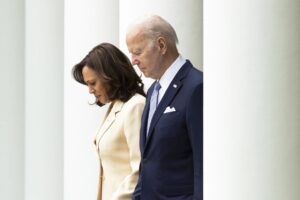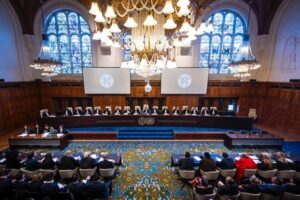
The National Interest Foundation Newsletter
Issue 246, July 26, 2024
Welcome to our NIF Newsletter. In this week’s latest edition, we delve into President Biden’s decision to drop out of the 2024 race and where things stand, examine the opposition to how Congress invited Netanyahu to speak despite the International Criminal Court’s (ICC) war crime charges against him, and analyze the International Court of Justice’s (ICJ) ruling regarding Israel’s illegal occupation of Palestinian territory.
Editor: Bassam Tarbush
President Biden’s Decision to Drop Out of the 2024 Race and Where Things Stand

As the dust settles in the aftermath of President Biden’s departure from the race, eyes now turn to what transpires as we approach the November election. (Photo from Getty Images)
President Biden’s Decision to Drop Out of the 2024 Race and Where Things Stand
Written By Camille Carter
Following a troubling debate performance, plummeting poll numbers, and growing concerns regarding his capability to run for and potentially serve another term, U.S. President Joe Biden dropped out of the 2024 race earlier this week on Sunday. While it had been anticipated as a possibility over the past several weeks, the historic and consequential move – coming so close to the upcoming election – sent shockwaves through both Democratic and Republican circles, setting the stage for a remaining campaign season unlike any other. As the political landscape shifts, both parties are now bracing for new dynamics and challenges. In a post on the social media platform X, Biden wrote “While it has been my intention to seek re-election, I believe it is in the best interest of my party and the country for me to stand down and to focus solely on fulfilling my duties as president for the remainder of my term.” Many quickly pointed out that his stepping down came on the heels of a debate performance that shocked and worried many of his party members and supporters. In a recent poll released by AP-NORC, only 35% of Democrats polled said that Biden should stay in the race. U.S. Representative Jim Costa (D-CA), U.S. Representative Jamie Raskin (D-MD), U.S. Representative Mike Levin (D-CA), and U.S. Representative Brittany Pettersen (D-CO) are among just some of the Congressmembers who had called for Biden to withdraw from the race last week. Media outlets had also reported that even top-ranking Democrats like U.S. Representative and Former Speaker of the House Nancy Pelosi (D-CA), U.S. Senate Majority Leader Chuck Schumer (D-NY), and U.S. House Minority Leader Hakeem Jeffries (D-NY) were privately expressing their concerns to Biden regarding his candidacy.
There had been rumors circling President Biden’s re-election campaign that his departure from the race could be inevitable, but the sudden nature of the announcement this past weekend surprised some and left others wondering where exactly it left the state of things. Almost thirty minutes after his announcement, a follow-up X post was made in which he announced his official endorsement of U.S. Vice President Kamala Harris saying “My very first decision as the party nominee in 2020 was to pick Kamala Harris as my Vice President…And it’s been the best decision I’ve made…Today I want to offer my full support and endorsement for Kamala to be the nominee of our party this year…Democrats – it’s time to come together and beat Trump.” Many key figures also expressed support for the Vice President’s potential nomination including Former President Bill Clinton, Former U.S. Senator, Secretary of State, and First Lady Hillary Clinton, U.S. Secretary of Transportation Pete Buttigieg, U.S. Senator Elizabeth Warren (D-MA), and U.S. Congresswoman Alexandria Ocasio-Cortez (D-NY). These are merely some of the over 200 Democrats who have come out to endorse Vice President Harris’s candidacy publicly. Just 24 hours into her 2024 presidential candidacy, Harris’s campaign made headlines by announcing that it had raised a whopping $81 million. Most recently today, Former President Barack Obama and Former First Lady Michelle Obama endorsed Vice President Harris for president as well.
In addition to the plethora of Democrats who were swift to throw their support behind Harris, none have stepped forward to directly challenge her for the impending Democratic nomination. Some have pointed out that with the Democratic National Convention still several weeks away in mid-August, she was not guaranteed as the party’s 2024 nominee for president. In the wake of Biden’s departure and even leading up to it, a few Democrats’ names had been tossed in the ring as alternative nominees including California Governor Gavin Newsom, U.S. Senator Joe Manchin (I-WV), and Michigan Governor Gretchen Whitmer. However, all of these have come out to endorse Harris except for Manchin who said “I think that we have a lot of talent on the bench, a lot of good people, and I’m partial to governors, because a governor can’t afford to be partial…They can’t afford to be partisan strictly, because that pothole or that bridge doesn’t have a D or an R on it,” implying that he was potentially holding out his support for a different candidate, but in recent days Manchin did state that he himself was not planning on running for president and challenging Harris for the Democratic Party’s nomination.
The news of Biden dropping out and endorsing Harris did not only affect Democrats’ campaign trail, as Republicans, and specifically Former President Donald Trump’s campaign reportedly were not exactly pleased with the incumbent president’s departure from the 2024 race. Much of Trump’s campaign material had been highlighting President Biden’s presumed failures and his alleged weakening physical and mental state. Thus, the campaign was designing itself to target and defeat Biden, and so the news of him dropping out forced a serious campaign strategy pivot. However, the former president’s team is not going down without a fight, now aiming to link the president and vice president together as one in an effort to make Harris culpable for Biden’s actions. On Sunday, senior Trump campaign officials Chris LaCivita and Susie Wiles said “They own each other’s records, and there is no distance between the two.” Additionally, one of Trump’s largest super PACs MAGA Inc. posted an ad stating that “They created the mess…They – no, Kamala – owns this failed record,” further trying to emphasize the connection between the two.
President Biden’s decision to step down from the 2024 race has undoubtedly reshaped the political landscape surrounding the upcoming November election, leaving both Democrats and Republicans trying to navigate uncharted waters. While Biden’s endorsement of Vice President Kamala Harris provides a clear direction for the Democratic Party to move towards, the time yet remaining until the mid-August Democratic National Convention means that this may not be officially finalized until then or at least shortly beforehand. On the Republican side, the anticipated shift in focus from Biden to Harris presents new challenges and strategies for the Trump campaign as they aim to link the two together. All of this leaves the nation preparing for a unique remaining campaign cycle and a consequential impending election.
Congress Invited Netanyahu to Speak Despite the ICC’s War Crime Charges Against Him

Thousands of protesters marched near the U.S. Capitol in Washington D.C. to voice opposition to Netanyahu’s visit to Congress. (Photo from The New York Times)
Congress Invited Netanyahu to Speak Despite the ICC’s War Crime Charges Against Him
Written By Sheyanne Barr
Israeli Prime Minister Benjamin Netanyahu’s controversial address to Congress this Wednesday afternoon was surrounded by a sea of opposition. The longstanding Israeli prime minister found himself facing criticism and denunciation on multiple fronts – both through large-scale protests and an array of boycotts against the speech and his visit to the nation’s capital. The disapproval is based upon valid scrutiny regarding Israel’s destructive Gaza War, which has garnered widespread condemnation from humanitarian groups, the United Nations, and political figures around the world. In addition to global outrage over egregious human rights violations and war crimes – which has even prompted an International Criminal Court (ICC) arrest warrant request on war crime charges – Netanyahu also faces deepening dissent domestically, where a recent poll found that over two-thirds of Israelis want him to leave office. All of this is even further compounded by ongoing criminal corruption charges against Netanyahu in Israel, something that many analysts have contended is one of the core reasons for his desire to prolong the now nearly 10-month long devastating conflict in Gaza.
Criticisms of Netanyahu are nothing new, and he has spent much of his political life trying to shake these off at various times. However, they have now reached a fever pitch, due to the global spotlight on Israel’s abusive actions in Gaza. This week, protesters gathered en masse in Washington D.C. to vocalize their collective distaste for the prime minister’s visit, while over 60 members of Congress chose not to attend his address in an objection of their own. The absentees included several notable members of Congress like U.S. Representative and Former Speaker of the House Nancy Pelosi (D-CA), U.S. Senator Elizabeth Warren (D-MA), and U.S. Representative Thomas Massie (R-KY), along with many others. Dozens of Democrats chose not to appear due to the humanitarian crisis and violations stemming from Israel’s conduct during its military operations. Others such as U.S. Congresswoman Alexandria Ocasio-Cortez (D-NY) also cited abstaining because of the outstanding criminal warrant request against Netanyahu. Massie appears to have been the lone Republican to have protested the address publicly, stating “I don’t feel like being a prop, so I won’t be attending.” Many Democratic lawmakers found other ways to spend the time with Pelosi among them who, along with 100+ others, spoke with the families of hostages currently held by Hamas. Vice President Harris was not in attendance as well, while even some who did sit in on the speech were still dissatisfied with it, including U.S. Representative Rashida Tlaib (D-MI) who held up a sign with the words “war criminal” throughout the address.
Thousands took to the streets of the U.S. capital city on Wednesday to demonstrate their opposition to Netanyahu’s visit and address too. The protests, organized by the ANSWER Coalition, the Palestinian Youth Movement, The People’s Forum, and the International Jewish Anti-Zionist Network, were meant to draw attention to various issues. These include the lack of progress being made toward a long-standing peace and the release of hostages, the continuation of U.S. funding to the violent and bloody conflict, and the tens of thousands of innocent civilians who have been killed or displaced since the onset of the war. The demonstrations could be seen in many places throughout Washington D.C., including the Watergate Hotel where Netanyahu was staying, areas of downtown D.C., and outside of the U.S. Capitol building. Legislators and protesters were not the only ones who vocalized their dissent with the address. Over 200 Congressional staffers stood behind a letter delivered on the 17th of July as well. The letter confirmed the staffers’ solidarity with the statements from U.S. Senator Bernie Sanders (I-VT) and U.S. Representative and Former Speaker of the House Nancy Pelosi (D-CA) against the Israeli prime minister’s address. It stated that the acts in opposition to the speech and visit were ones of morality and thus called on other elected officials to follow suit.
For all of the effort put into showing Netanyahu the displeasure of much of the American public and political leaders regarding his war crimes and human rights abuses, the Israeli prime minister was outwardly obstinate and defiant during his speech. Shamelessly and immorally, Netanyahu attempted to downplay the tens of thousands of innocent civilians killed while also calling on the support of the American people until “the war is won.” His fiery remarks did nothing to address the prescient and alarming concerns that scholars, lawyers, activists, lawmakers, human rights organizations, and ordinary citizens at-large have raised with Israel’s actions.
ICJ Ruling Regarding Israel’s Illegal Occupation of Palestinian Territory

The International Court of Justice has reaffirmed what human rights activists have been arguing for years. (Photo from the ICJ)
ICJ Ruling Regarding Israel’s Illegal Occupation of Palestinian Territory
Written By Cameron Reynolds
After 18 months of public hearings, the United Nations (UN) International Court of Justice (ICJ) released an advisory ruling on Israel’s illegal occupation of Palestinian territory, declaring that its settlements and presence in the West Bank is a violation of international law. The ruling also deems that Israel’s actions and policies are discriminatory and contradictory to the UN prohibition of apartheid and racial segregation. The decision calls upon Israel to cease new expansion efforts, repeal legislation regarding unlawful territorial occupation, and provide appropriate reparations. It is important to note that the finding was not sparked by a lawsuit between Israel and Palestine, but was instead called for by the UN General Assembly – making the ruling one of an advisory nature. The ICJ has delivered other advisory rulings regarding Israeli actions in the past. Back in 2004, it concluded that Israel’s construction of a separation wall inside illegally-occupied Palestinian territories was a clear violation of international law and human rights, but despite this the Israeli government has since continued its unlawful encroachment into Palestinian land and established more illegal settlements. Thus, the misalignments between Israel’s policies and the ICJ’s advisory rulings have been prevalent for decades.
The recent ICJ advisory opinion underscores what social justice and human rights activists have been arguing and drawing attention to for years. Erika Guevara Rosas – Amnesty International’s Senior Director for Research, Advocacy, Policy, and Campaigns – stated “This is a historic vindication of the rights of Palestinians who have endured decades of cruelty and systematic human rights violations stemming from Israel’s unlawful occupation.” Various countries and organizations around the world have conveyed their support for the ruling. Australian Prime Minister Anthony Albanese applauded the ICJ’s “role in upholding international law.” Similar statements have been released by the Belgian and Bolivian Ministers of Foreign Affairs, Spanish officials, and the United Kingdom’s Labour government. The Palestinian Authority also praised the court’s ruling, after years of lobbying within the UN General Assembly. Mai El-Sadany, the Executive Director of the Tahrir Institute for Middle East Policy, highlighted that “The world’s highest court established clearly the illegality of Israel’s occupation and its settlement policy and practices,” discrediting Israel’s absurd claims of self-defense.
The ICJ’s ruling is seen as a rebuttal to Israel’s decades of unlawful seizures of land in Palestinian territory. Israel’s advancements can be seen as a failure by the international community to concretely implement recommendations by the ICJ, allowing for Israel to continuously ignore international law. The recent ICJ decision also follows nearly ten months of Israel’s disregard for international humanitarian law through its destructive War on Gaza whereby Israel has been deeply criticized for its indiscriminate attacks against civilians. The ruling is not simply a legal setback for Israel, as it opens the door for Karim Khan – the Chief Prosecutor for the International Criminal Court – to prosecute Israeli government officials responsible for the territorial infringements.
Following the ICJ’s advisory ruling, the issue will now return to the UN General Assembly. The UN Secretary-General’s Deputy Spokesperson, Farhan Haq, stated that the Assembly will now “decide how to proceed in the matter.” The potential resolution by the General Assembly will not be binding, but likely an influential decision from a global body that represents all member nations. Possible repercussions for Israel include the suspension of its rights and privileges within various UN entities and expulsion from the UN with approval from the Security Council. Undoubtedly, the ruling has further damaged Israel’s international reputation and standing, at a time when it was already facing widespread criticism for its egregious human rights violations in Gaza. Despite the lingering consequences, Israel has unsurprisingly refused to pull out of illegally-occupied East Jerusalem and the West Bank. As such, there is a need for substantive repercussions to Israel. The harmful cloud of potential further annexation in the West Bank lingers as well, with various Israeli officials recently making inflammatory remarks calling for this to take place. While the long-term impact of the ruling remains to be seen, human rights and social justice activists hope that it will at least deter any additional unlawful land seizures by laying out and clearly defining the illegality of Israel’s occupation of Palestinian territory at the world’s highest court.
